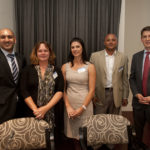

The COO panel was moderated by Albrecht Gantz of RisCura Analytics. He opened the session stating that the South African landscape had “drastically changed” since 2005/2006, the period during which large institutional allocations toward hedge funds were initially made. A number of key requirements have grown out of the fact that the SA hedge fund industry is essentially supported by institutional rather than retail investors. Chief amongst these requirements are best of breed service models, greater levels of transparency and more efficient administration and communication levels. The challenge to “new” entrants or “talent” is that these minimum requirements establish very high hurdles to entry, making it more difficult for the industry to grow. Justin added that operational setup in South Africa is simpler than it is in other markets because we have fewer service providers for investors to do due diligence on. Assisting with this setup is vital, according to Justin. With these outsourced plans in place, business can grow.
The panel moved to the topic of intellectual property and information sensitivity, which is one of the key competitive advantages smaller, more flexible hedge fund managers use to explain above average performance. The big challenge for more regular access to transparent reporting as required by large, sophisticated investors, was to ensure confidentiality agreements were drawn up to avoid the leaking of sensitive information. James then questioned whether or not investors were making effective use of information from hedge fund managers. He continued by stating that the majority of end-investors are in fact institutions and not individuals, and that fund of funds needed to ensure that in-depth reporting was provided. Often pension fund members move in and out, which leaves an urgency for accurate weekly reporting. James explained Edge Capital’s approach to this, saying, “We have spent the past five years building proprietary systems we can look through and find out what our effective exposures are from underlying managers, aggregate that up and report through to clients. This is on a daily basis. We have complete transparency on what is going on. It really has evolved.”
The COO panel agreed that more regular, detailed reporting requirements would become an increasing problem in a regulated environment. James responded by saying that managers have a responsibility to employ the right people to help build the infrastructure, ensuring their business is equipped to deal with the changes to come. He added that by not doing so, they might not have a company in the years ahead.
The final session of the day was run by the Hedge Fund Firms of Tomorrow panel. Their discussion covered industry changes over time. The topic of trust arose once again with a consensus view that transparency and education would create the trust needed between investors and fund managers.
The pending regulatory changes could help the industry become mainstream, but, it could also be a challenge from an investment perspective to then “remain niche”. It is important to be different and to offer products that make a difference. Lynn Miller mentioned that multi-national businesses had been examining Edge Capital’s business models in recent years, in order to identify and come up with innovative products and strategies.